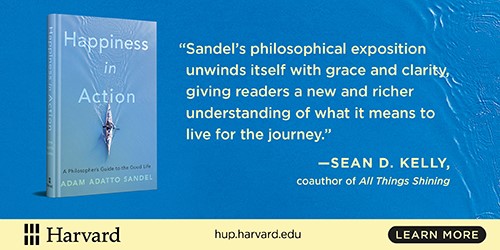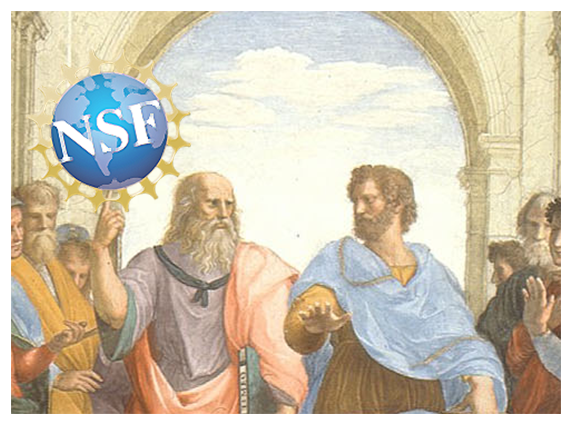
Several philosophers have been awarded grants from the National Science Foundation (NSF) over the past couple of months.
They are:
- Felipe de Brigard (Duke University)
“The Nature of Brain Networks in Cognitive Neuroimaging”
This project seeks to clarify conceptual challenges in the burgeoning field of network neuroimaging. Network neuroscience uses mathematical tools from graph theory to understand the brain, its relationship to the mind, and the neural basis of neurological and psychiatric illnesses. However, the highly abstract nature of network analysis has produced deep methodological and conceptual disagreements regarding what exactly network methods reveal about the brain and its functions. This project aims to clearly articulate these disagreements and to use tools from philosophy of science to develop the conceptual foundations necessary to resolve them. The project’s findings will be disseminated through both scholarly and public channels and will be of interest to practicing network neuroimagers, philosophers of science, clinical neuroscientists, and members of the general public interested in brain function and malfunction. The central points of disagreement among practicing network neuroscientists concern the extent to which the structures revealed in network neuroimaging are biologically meaningful, as opposed to merely instrumental mathematical abstractions, and relatedly, whether and to what extent functions can be attributed to these networks. The research team will analyze and build on survey results among practicing network neuroscientists that unveil these conceptual disagreements. The project then seeks to use tools from philosophy of science to develop a conceptual framework with two central aims: To show how different modeling commitments affect the extent to which brain networks can be interpreted as biologically real or meaningful, and to articulate the appropriate conditions under which functions can be attributed to brain networks. The results of this project will provide insight into both the strengths and limitations of network methods when employed for different research purposes in neuroscience. These insights will help researchers overcome hurdles that currently threaten progress in the field, will open new avenues of research in philosophy of science, and will facilitate clearer interpretations of results in this cutting-edge area of neuroscience. ($401,854)
- Carl Craver (Washington University in St. Louis)
“Time and Episodic Memory: Neuropsychology Meets Philosophy”
This project investigates how the capacity to remember past personal experiences contributes to the emergence and maintenance of the sense of time. Individuals with episodic amnesia, that is, amnesia for vivid personal past experiences, are modeled in both science and the popular media as trapped in time. This core metaphor shapes our understanding both of what episodic memory is (mental time travel) and of its role in our lives as people (anchoring us in time). Amnesia is seen accordingly as a pathology affecting an individual’s entire subjective temporality, one that undermines their decisions about the future and scuttles all possibility of autonomous living. Our work shows that amnesic individuals are not trapped in time; they are capable of more as moral and practical agents than the trapped-in-time model would lead one to predict. We study temporal cognition in individuals with episodic amnesia to learn how episodic memory is involved in cognition about time. Do individuals with amnesia develop and maintain concepts of the past, present, and future? Do they understand time’s irreversible order or that events can be sequenced earlier to later? Do they care about the difference between the future and the past? Do they discount the value of future rewards, make impulsive choices, or exhibit presentist bias in their practical and moral decisions? Research in our and other labs increasingly reveals that individuals with amnesia are not trapped in time but understand time and its implications well. These findings are transformative for humanists interested in the value of memory in human life, philosophers interested in the source of our knowledge of time, scientists struggling to understand what memory is and how it contributes to our lives as persons, and, finally, to clinicians trying to help people with memory loss live fuller human lives. ($282,603)
- Chad Gonnerman (University of Southern Indiana)
“Investigating the Philosophical Commitments of University Scientists across Disciplines”
This award supports a collaborative research project at the interface of philosophy of science and social studies of science. Researchers in philosopher of science, sociology, and anthropology will conduct an empirical study of the philosophical commitments of scientists across a broad range of scientific disciplines. It is often thought that these commitments are shared within each scientific discipline, that they differ considerably between scientific disciplines, and that these differences pose a serious challenge to engaging in effective cross-disciplinary research. This project will be the first study of philosophical commitments to be conducted with a large representative sample of scientists across many disciplines. The study has two fundamental goals: to achieve an analytical depth of understanding of how the philosophical commitments of scientists influence their scientific practices, and to achieve a deeper understanding of the extent to which prior cross-disciplinary experiences of scientists shape their philosophical commitments. Beyond enhancing the efficacy of cross-disciplinary research, this project will serve to enhance public literacy of science by providing insights for revising the tools that experts in public understanding of science use to investigate how the views of non-scientists about science or scientific thinking relate to their views on social issues. Philosophical commitments refer to how scientists conceptualize the world and its scientific study, framing how scientists understand and conduct their research. These philosophical commitments have three dimensions: what methods are effective in acquiring knowledge (epistemology), what categories are fundamental (ontology), and what social values are important (axiology). The project will begin by interviewing approximately 50 scientists to determine their philosophical commitments and how they manifest in their scientific practice. The interviews will facilitate the development of survey instruments that are to be used on a much larger scale to measure the philosophical commitments of scientists. These instruments will then be used to survey a national sample of approximately 3,500 US scientists from a wide range of scientific disciplines. The survey data will then be analyzed to test the hypotheses that philosophical commitments align with scientific disciplines and that such philosophical commitments vary when scientists have had prior cross disciplinary research experience. The measurement instruments to be developed in this project will be generalizable; they can subsequently be used by others to investigate philosophical dimensions of scientific practice both within and outside of STEM fields, to inform science education, and efforts to facilitate cross-disciplinary research. ($67,897)
- Patrick Lin (California Polytechnic State University)
“Space Cybersecurity, Policy, and Risks”
Outer space assets are critical to modern life, such as for GPS positioning, financial-services connectivity, surveillance of disaster areas, and global communications. Their strategic importance and physical distance from Earth make them particularly vulnerable to cyberattacks. This threat increases over time with technological advances and the accelerating pace of space activities. Much of these activities are conducted without public comment on cybersecurity risks. The stakes become even higher given that more space debris could be created by cyberattacks, either deliberately or unintentionally. These attacks could threaten safe orbits and launches. Thus, understanding these risk scenarios, from technical and policy perspectives, is essential to understand and mitigate cyber vulnerabilities in space. In doing so, the project is a contribution to national security, economic stability, and public safety. This project offers a broad set of scenarios and taxonomy on how cyberattacks could occur with space technologies, including novel or rare threats. Because space law is still under-developed, the study includes an analysis of the ethical, legal, and policy issues and gaps that arise from multiple risk scenarios. With a team of ethicists and technologists, the project is interdisciplinary. The project is also guided through a workshop for additional domain expertise in space systems architecture, space law, and cyber law. The goal is to deliver a public report, citizen outreach, and student learning about space cybersecurity, ethics, and policy. Through this effort, the project aims to protect the vital space domain from the damage of cyberattacks that have plagued other domains important to human life. ($299,538)
- Angela Potochnik (University of Cincinnati)
“Engaging Science: Transforming Graduate Education through Public Engagement with Science”
Improved public engagement with science is needed to promote scientific literacy and support science-informed policies and practices to address society’s critical issues. Further, scientists are increasingly called upon to engage in public outreach about their research. Many people with graduate degrees in science are employed in roles involving public outreach. For these reasons, education on conducting public engagement with science should be meaningfully integrated into STEM graduate education. This NSF Innovations in Graduate Education (IGE) award to the University of Cincinnati will investigate the value of systematic instruction in public engagement with science for meaningful public engagement, interdisciplinary collaboration, and diversity and inclusion in STEM. The researchers will develop a 3-part educational sequence called the “Engaging Science” curriculum. The curriculum is innovative in its use of interdisciplinary collaboration, community partnership, and perspectives from the philosophy of science to provide graduate students with the background and skills needed to lead effective public engagement with science. This research project will rigorously examine the transformative impact of public engagement with science instruction, with the potential to advance the public reach of STEM disciplines and diversity and inclusion in STEM disciplines. The project will run three annual cycles of the Engaging Science curriculum with thirty graduate students in each cycle. The three part curriculum begins with an intensive workshop providing hands-on experience in a museum setting. A semester-long course then follows which culminates in outreach projects conducted by multidisciplinary teams. Third, and finally an internship with a community partner organization leads to an individual outreach project. A mixed-methods convergent parallel research design will be used to combine surveys, interviews, focus groups, and archival data. The study will examine the curriculum’s potential to equip graduate students to engage public audiences more meaningfully. The research plan combines quantitative and qualitative methods to examine the unique and additive impact of each level of training on short- and long-term outcomes. This approach will facilitate the adaptation of the curriculum for implementation in diverse contexts. ($499,999)
- Brian Robinson (Texas A&M University-Kingsville)
“Investigating the Philosophical Commitments of University Scientists across Disciplines”
This award supports a collaborative research project at the interface of philosophy of science and social studies of science. Researchers in philosophy of science, sociology, and anthropology will conduct an empirical study of the philosophical commitments of scientists across a broad range of scientific disciplines. It is often thought that these commitments are shared within each scientific discipline, that they differ considerably between scientific disciplines, and that these differences pose a serious challenge to engaging in effective cross-disciplinary research. This project will be the first study of philosophical commitments to be conducted with a large representative sample of scientists across many disciplines. The study has two fundamental goals: to achieve an analytical depth of understanding of how the philosophical commitments of scientists influence their scientific practices, and to achieve a deeper understanding of the extent to which prior cross-disciplinary experiences of scientists shape their philosophical commitments. Beyond enhancing the efficacy of cross-disciplinary research, this project will serve to enhance public literacy of science by providing insights for revising the tools that experts in public understanding of science use to investigate how the views of non-scientists about science or scientific thinking relate to their views on social issues. Philosophical commitments refer to how scientists conceptualize the world and its scientific study, framing how scientists understand and conduct their research. These philosophical commitments have three dimensions: what methods are effective in acquiring knowledge (epistemology), what categories are fundamental (ontology), and what social values are important (axiology). The project will begin by interviewing approximately 50 scientists to determine their philosophical commitments and how they manifest in their scientific practice. The interviews will facilitate the development of survey instruments that are to be used on a much larger scale to measure the philosophical commitments of scientists. These instruments will then be used to survey a national sample of approximately 3,500 US scientists from a wide range of scientific disciplines. The survey data will then be analyzed to test the hypotheses that philosophical commitments align with scientific disciplines and that such philosophical commitments vary when scientists have had prior cross disciplinary research experience. The measurement instruments to be developed in this project will be generalizable; they can subsequently be used by others to investigate philosophical dimensions of scientific practice both within and outside of STEM fields, to inform science education, and efforts to facilitate cross-disciplinary research. ($90,509)
- Ronald Sandler (Northeastern University)
“Summer Training Program to Expand the Al and Data Ethics Research Community”
This award supports the development of an intensive, interdisciplinary summer program to provide training for the next generation of AI and data ethics researchers by targeting doctoral students with a background in ethics. Participants will receive additional training in the philosophy and ethics of technology alongside technical training, enabling them to collaborate with AI practitioners and researchers to better integrate social and ethical considerations into AI. Program participants will learn from and be mentored by leading experts in machine learning, autonomous robotics, AI and information ethics, technology law, and other disciplines and apply their new knowledge to solve important problems in the development of AI. This project’s primary aim is contributing to societal capacity to responsibly develop and implement AI by helping to build a diverse community of AI ethics experts who will shape and build the field of AI ethics going forward. The AI and Data Ethics Training program will have three core objectives. It will increase participant’s content mastery needed to perform quality research in this area; it will provide professional development opportunities to prepare participants to conduct interdisciplinary, impactful research that reaches beyond the academy; and it will foster a collaborative and diverse community of AI and data ethics researchers. The program will accomplish these objectives through a seminar on foundational topics and current issues in AI and data ethics led by an interdisciplinary team of experts, interdisciplinary faculty support on research projects related to AI and data ethics, and participation in inter-generational and interdisciplinary mentoring groups. The training program also includes professional development workshops on how to approach public-facing scholarship, develop grant proposals, build collaborations with partners outside of academia, and practice inclusive mentoring, as well as an expert speaker series where researchers share cutting edge work, discuss career pathways, and develop connections with participants. ($299,375)

You can learn more about NSF grants here.
(And if you know of any philosophers who won NSF grants with a start date of August 1, 2022 or later who aren’t on the above list, please let me know and I will add them.)





